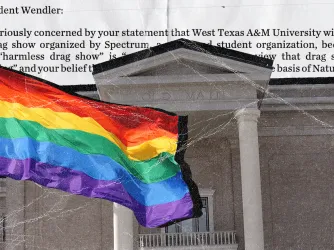Table of Contents
Catch-22 on Yale’s Singapore Campus: Students "Free to Express Views," So Long as They Don't
Last week, I discussed the commitment to free expression that American universities should maintain when they open overseas campuses. I noted that Yale University was, on the one hand, promoting its new Singapore campus (Yale–NUS) as a place where students would be able to "express themselves freely." On the other hand, I noted that the Dean's statements were worrying: "What we think of as freedom, they think of as an affront to public order."
Now, The Wall Street Journal is reporting that Yale's avowed commitment to free expression is worthless. As the Journal reports, "[s]tudents at the new school 'are going to be totally free to express their views,' but they won't be allowed to organize political protests on campus, said Pericles Lewis, the college's new president, in an interview last week." (Emphasis added.) Lewis also said: "[W]e won't have partisan politics or be forming political parties on campus." In other words, by saying students are "totally free to express their views," what Lewis means is that students are totally not free to express their views.
With respect to political protests on the Yale campus, "Singapore's Ministry of Education said faculty and students of Yale–NUS College 'will have to comply with the university rules as well as Singapore laws' and, as in all academic institutions in Singapore, wouldn't be allowed to participate in student demonstrations and protests on campus unless approved by the university administration."
While Yale University must comply with local laws, it should not act as the enforcement arm of the Singaporean government's censorship apparatus. Rather than providing political cover for censorship by writing a ban on political protests into Yale policy, Yale–NUS policy could be to approve all student protests automatically. If that is not an option, Yale could refer all requests to protest to the Singaporean government so that blame for any rejection is squarely at the feet of that government.
And the best case scenario—Yale–NUS serving as a zone of free expression—might not be that far-fetched. Dean Lewis said: "Although the 'constraints are somewhat different' in Singapore with regard to free speech ... the city-state is 'generally an open society' and its people 'are open to all kinds of cultural experiences.'" If true, Singapore's societal commitment to free speech might give Yale's New Haven campus a run for its money. How depressing.
Recent Articles
Get the latest free speech news and analysis from FIRE.

The findings against Harvard are a blueprint for a National Campus Speech Code

VICTORY! 5th Circuit blocks West Texas A&M’s unconstitutional drag ban

Wide-ranging coalition of 'friends of the court' continue to support citizen journalist Priscilla Villarreal in her return to the Supreme Court
